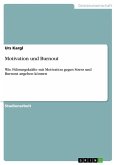Diplomarbeit aus dem Jahr 2014 im Fachbereich Psychologie - Arbeit, Betrieb, Organisation und Wirtschaft, Note: 2, Leopold-Franzens-Universität Innsbruck (Psychologie), Sprache: Deutsch, Abstract: Prokrastination, verstanden als Tendenz Aufgaben aufzuschieben, wird in der wissenschaftlichen Diskussion mit negativen Folgen und Attributionen in Verbindung gebracht. Diese Arbeit untersucht, ob ein Zusammenhang zwischen dem Führungsverhalten von Vorgesetzten und dem Prokrastinationsverhalten der Mitarbeiter besteht. Anhand einer Online-Befragung wurden von 125 Teilnehmern Daten zum Prokrastinationsverhalten, dem Führungsverhalten der Vorgesetzten und zu ausgewählten arbeitsbezogenen Variablen erhoben. Es wurden der Multifactor Leadership Questionnaire in deutscher Fassung (Felfe & Goihl, 2002), der allgemeine Prokrastinationsfragebogen (Höcker, Engberding, & Rist, 2013) und die Kurzskala Prokrastination am Arbeitsplatz (Eckert, Scheel, Prem, Gerdenitsch, & Korunka, 2014) eingesetzt. Die Studie ergab, dass positiv assoziiertes Führungsverhalten nicht negativ mit Prokrastination im Zusammenhang steht und negativ assoziiertes Führungsverhalten keinen positiven Bezug zu Prokrastination aufweist. Die Ergebnisse legen nahe, dass Prokrastination nicht zwingend als negatives Verhalten eingestuft werden muss und eröffnen neue Perspektiven für die Prokrastinations-Forschung.
Abstract. Procrastination, described as the tendency to postpone an intended course of action, is a behavior that is associated with negative outcomes. This work is to explore if there is a relationship between the leadership behavior of supervisors and the procrastination of their employees. Using the German version of the multifactor leadership questionnaire (Felfe & Goihl, 2002), the general procrastination questionnaire (Höcker, Engberding, & Rist, 2013) and the short scale of procrastination in the workplace (Eckert, Scheel, Prem, Gerdenitsch, & Korunka, 2014), 125 participants answered an online-questionnaire about their procrastination behavior, their supervisor's' leadership behavior and other work-oriented information. The study shows no negative relation between positive associated leadership behavior and procrastination, and in reference to negative associated leadership behavior no positive relation to procrastination. Thus, the results suggest that there might be a self-regulating or information-processing form of procrastination, and open up some new avenues for future investigations.
Hinweis: Dieser Artikel kann nur an eine deutsche Lieferadresse ausgeliefert werden.
Abstract. Procrastination, described as the tendency to postpone an intended course of action, is a behavior that is associated with negative outcomes. This work is to explore if there is a relationship between the leadership behavior of supervisors and the procrastination of their employees. Using the German version of the multifactor leadership questionnaire (Felfe & Goihl, 2002), the general procrastination questionnaire (Höcker, Engberding, & Rist, 2013) and the short scale of procrastination in the workplace (Eckert, Scheel, Prem, Gerdenitsch, & Korunka, 2014), 125 participants answered an online-questionnaire about their procrastination behavior, their supervisor's' leadership behavior and other work-oriented information. The study shows no negative relation between positive associated leadership behavior and procrastination, and in reference to negative associated leadership behavior no positive relation to procrastination. Thus, the results suggest that there might be a self-regulating or information-processing form of procrastination, and open up some new avenues for future investigations.
Hinweis: Dieser Artikel kann nur an eine deutsche Lieferadresse ausgeliefert werden.








